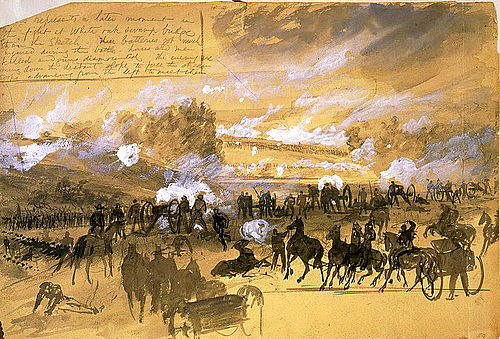As in the previous battles of the Seven Days Campaign, the Confederate plan for the attack on McClellan on June 30th, 150 years ago today, was again executed badly. Lee intended for Jackson to cross White Oak Swamp and strike the Federal northern flank while the rest of the Confederate troops pushed east. For various reasons the divisions of Huger, Holmes and Magruder failed to have much effect on the battle. Huger encountered felled trees across his route, so he spent the day building a new one rather than clearing away the trees. As on the previous day Magruder was unsure what to do, and eventually he was ordered by Lee to join Holmes. Holmes made an attempt to assault the Federal left near Malvern Hill, but after suffering one repulse and loosing a few men he refused to attack again.
 |
| Battle of White Oak Swamp |
Jackson was having troubles as well, in what would be his most inexplicable and controversial day of the war. He needed to rebuild a bridge across White Oak Swamp. Arriving in the area, he had found Federals in some strength on the other side of the water. He brought up artillery and drove them away from the bridge site, but when his men set to work on the bridge the Yankees returned and drove off the workmen. Colonel Thomas Munford of the cavalry found a ford downstream that seemed to be practicable and Wade Hampton built a makeshift bridge that could be used for infantry at least, if not artillery. However, when these developments were reported to Jackson, he did not act on them. Saying nothing, he walked off and went to sleep. He woke up for supper, and after falling asleep with a biscuit in his mouth, said, "Now, gentlemen, let us at once to bed, and rise with the dawn, and see if tomorrow we cannot do something." Many reasons have been suggested for Jackson's lack of aggressiveness, but the most likely appears to be sheer exhaustion. He had not gotten much sleep for many days, and had spent several nights in the saddle. He was probably simply too tired to continue to effectively lead his forces. This exhaustion was a great misfortune for the Confederacy.
 |
| Glendale Battlefield via CWT |
Captain King gave us the command: “By the right of companies to the front, Battalion! Right Face! Double Quick! March!” We obeyed the command with a right good will and soon lessened the distance between us and the battery... We advanced in this manner until just before we reached the edge of the thicket, and within three hundred yards of the battery, the command was given: “By Company into line, March!” and the movement executed at the double-quick through us into line of battle without retarding our progress.. straight forward into that flame, into the jaws of death we pressed. Those of us left standing poured a volley at a distance of no more than 10 paces into the faces of the gunners. They fell across their guns and under the wheels, whole teams of horses plunging about in their mad agony, trampling under food the wounded.
Both sides fought hard. Many soldiers remembered desperate hand to hand fighting with bayonets ad gun butts. The front lines on both sides were reinforced and the fighting continued. The men fired at each other through the smoky underbrush, sometimes firing so quickly their guns became too hot to hold. Darkness finally ended the fighting, with the Federals hurt, but unbroken. Through the failure of the Army of Northern Virginia to concentrate on the Federals, they had lost perhaps their best chance of victory during the war. General Edward Porter Alexander wrote after the war:
"[W]hen one thinks of the great chances in General Lee's grasp that one summer afternoon, it is enough to make one cry to go over the story of how they were lost. And to think too that our Stonewall Jackson lost them. He had been great & grand & glorious before & he was so, too, many a time again, until he gave his life in battle within less than eleven months afterward. But never, before or after, did the fates put such a prize within our reach. In spite of all the odds against us, it is my individual belief that on two occasions in the four years we were within reach of military successes so great that we might have hoped to end the war with our independence, had we gathered the rich victories which seemed easily possible. ...[T]he first was Bull Run [in] July '61, when a vigorous pursuit might have caused the abandonment of Washington. ... This chance of June 30th '62 impresses me as the best of all."




2 comments:
I've recently discovered that my 3x great-grandfather was taken prisoner at the Battle of Glendale. Would you happen to know where he would have served his time as POW?
I'm not sure, but the records probably exist out there somewhere you could find them!
Post a Comment